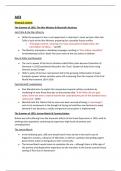AO3
Historical context
The Summer of 1935: The War Ministry & Marshall’s Business
Jack Tallis & the War Ministry
• While the prospect of war is not uppermost in characters’ mind, we learn that Jack
Tallis is bush at the War Ministry preparing for a possible future conflict
o “Exchange controls, rationing, the mass evacuation of large towns, the
conscription of labour…” (p149)
• The Ministry anticipates a bombing campaign resulting in “five million causalities”
foreshadowing Cecilia’s death five years later at the tub station in Balham
Rise of Hitler and Mussolini
• The rise to power of the fascist dictators Adolf Hitler (who become Chancellor of
Germany in 1933) and Benito Mussolini, the ‘Duce’ (leader) of Italy led to rising
tensions across Europe
• Hitler’s policy of German rearmament led to the growing militarisation of major
European powers whose societies were still recovering from the trauma of the First
World War between 1914-1918
Paul Marshall’s exploitation
• Paul Marshall aims to exploit this momentum towards military escalation by
marketing his new Army Amo bar on the premise that “if Mr Hitler did not pipe
down, there was even a chance that the bar could become part of the standard-issue
ration pack.” (p50)
• Marshall tells the Tallises that he was even been accused of being a “warmonger”,
such in his excitement at the thought of having to build five new factories to meet
demand if war becomes a reality and general conscription is implemented
The Summer of 1935: Jarrow March & Country Estates
Britain was still suffering from the traumatic effects of the Great Depression in 1935, with its
working-class population continuing to experience high levels of poverty and
unemployment
The Jarrow March
• In the following year, 200 men would march from Jarrow in the north-east of
England to London, a distance of 300 miles, to deliver a petition demanding urgent
government action to bring jobs to their community
• The Jarrow March would come to symbolise the era – although there is little sign of
the poverty and desperation experience by the marchers in the Surrey country house
setting of Part One in Atonement
,Decline in English fortunes
• Part One of the novel is set in a privileged world of wealth and status which was
about to disappear
• There had been a steady decline in the fortunes of the English country estate since
the end of the nineteenth century
• This became more severe with the onset of WW1 when members of the huge staff
required to run a country house left to fight or find higher wages in towns and cities
Impact of WW2 on country estates
• The final blow for the English country estate was the outbreak of WW2 (1939-1945)
• Many country house were requisitioned by the government during the war and were
often returned to their owners in poor condition. With the addition of higher taxes
and lower incomes from agriculture, country estates became unaffordable for all but
the very richest in society: an upper-middle-class family such as the Tallises could not
hope to afford the maintenance costs of such a grand house
Dunkirk in 1940
The Second World War began in September, 1939 when the German army invaded Poland,
prompting Britain and France to declare war on Germany
Reasons for British evacuation
• British troops began moving to France and Belgium that month to help defend these
countries from a German invasion
• However, a German attack in May, 1940 was so devastating that France would fall to
Hitler in just six weeks
• British forces were in serious danger of being encircled by invading forces from both
north and south and so the decision was taken to order British troops to fall back to
the northern coast of France to be evacuated home
Operation Dynamo
• Codenamed Operation Dynamo, the Dunkirk evacuations began on 26 May, 1940,
and lasted until 4 June
• The British used any seagoing vehicle they could find to bring troops home, with
some troops brought home in such rudimentary crafts such as rowing boats
• 338,000 Allied soldier were successfully evacuated from France, with the RAF and a
small defending force at Dunkirk holding off a German attack
Significance of evacuations
• The evacuations meant that the allies survived to fight another day: Allied troops
would return to France four years later and eventually succeed in liberating the
county from the Germans
, London in 1940
Throughout 1940, Britons lived in fear of a German invasion
If the Invader Comes
• The Ministry of Information issued over 14 million copies of a leaflet entitled If the
Invader Comes
• In June, German forces landed in the Channel Islands which they would occupy for
the next five years
Luftwaffe bombing raid
• The Luftwaffe (German Air Force) began its bombing raids in July 1940
• The Battle of Britain would last until the end of October, with London enduring 57
consecutive nights of bombing during the Blitz
Bombing of Balham tube station
• On 14 October 1940, at least 64 people were killed when Balham tube station, which
was being used as an air-raid shelter, was bombed
• McEwan uses this incident as the cause of Cecilia’s death in the novel
Social context
Social Class: The Tallises and Robbie
The Tallises are an upper-middle class family with a level of inherited wealth. Jack Tallis is a
senior civil servant working for the War Ministry in Whitehall. Emily sees the day-to-day
running of the house
Difference: Cecilia and Robbie
• Cecilia and Robbie have both been educated at Cambridge University but there is a
marked difference in social class between them
• Grace Turner, Robbie’s mother, is the cleaning lady for the Tallises and cannot afford
to send her son to university
Jack’s financial support
• Robbie needs the considerable financial support given by Jack Tallish to entertain the
idea of studying medicine
• Emily Tallis refers to her husband’s decision to fund Robbie’s studies as coming from
“some levelling principle” (p151) whereby he wants to allow Robbie the opportunity
to bridge the strict class divide which existed in English society at that time
Emily’s class snobbery
• Emily considers her husband's charitable behaviour as “meddling” (p151), suggesting
that she is sceptical of this small challenge to the English social order





